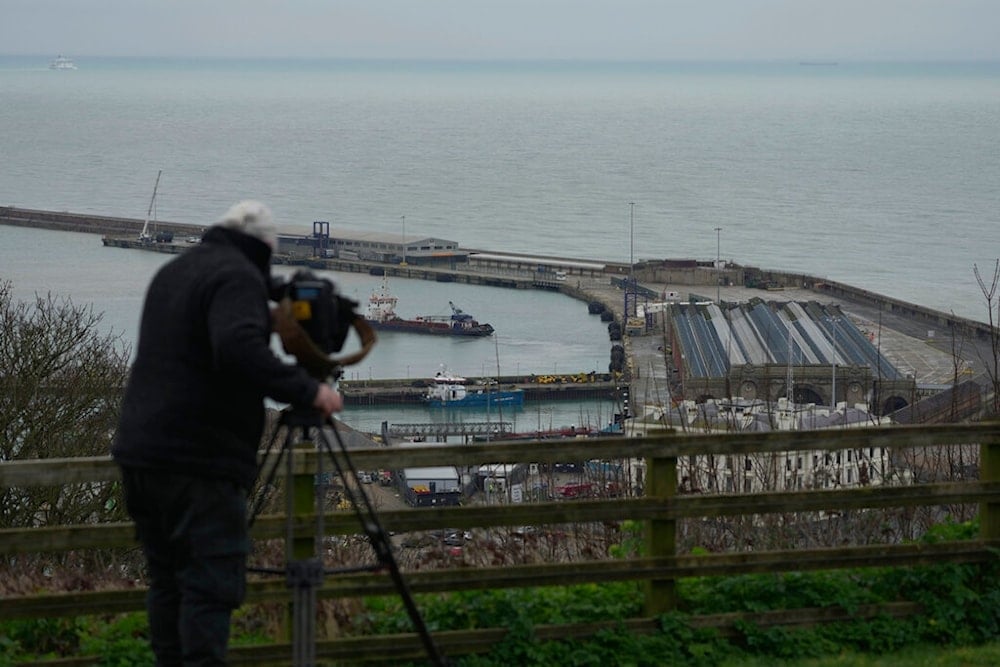UK to replace 5-year refugee residency route with 20-year plan
The UK is introducing a major asylum overhaul that will require refugees to wait 20 years for permanent residency while tightening support, family reunification, and deportation rules.
-

A cameraman films the migrant processing centre in Dover, Kent, England, Tuesday, March 7, 2023. (AP)
The United Kingdom is moving ahead with one of its most far-reaching revisions of asylum policy in decades, with the Home Office confirming on Monday that refugees will now face a 20-year wait before they can obtain permanent residency.
This extends the current five-year route to Indefinite Leave to Remain (ILR) to an unprecedented two-decade process, transforming refugee protection into a long-term temporary status.
Under the new system, people granted asylum will still receive protection, but only in short cycles that must be renewed every 30 months. Each renewal requires individuals to demonstrate that the fears that led them to flee remain valid. This shift effectively dismantles the previous five-year pathway and embeds long-term precarity into the lives of refugees.
As the Home Office put it, "In the future there will be no path to indefinite settled status in the UK on core protection, until a refugee has spent 20 years in the country, an increase on the current five years."
Refugee Support Revoked
The package of reforms goes well beyond settlement rules. The government is preparing to abolish the statutory obligation to provide basic support for asylum seekers who would otherwise be left destitute, a requirement introduced in 2005 to comply with EU directives. The move replaces guaranteed housing and subsistence payments with a discretionary model, allowing the state to offer support only where it chooses to do so.
"We will remove the current legal obligation to provide support to asylum seekers who would otherwise be destitute - a requirement introduced in 2005 to implement EU law, to which the UK is no longer bound. In the coming months this duty will be revoked, and we will restore a discretionary power to offer support, as previously provided under UK law," the Home Office said.
Officials are also preparing to tighten family reunion procedures and widen the list of “safe” countries for removals, meaning more people could face deportation even if they have been in the UK for years. The measures accompany broader efforts to negotiate new “returns agreements” with third countries and to restrict routes by which refugees can reunite with spouses or children.
Tougher Measures
These changes come amid sustained political pressure over irregular Channel crossings. More than 45,700 people arrived in 2022, a record high, while over 36,800 individuals crossed by small boat in 2024. Ministers argue that these figures justify harsher rules, pointing to the millions of pounds spent daily to house asylum seekers in hotels. The government insists that a tougher system will act as a deterrent, ease the financial burden on public services and restore public confidence in the immigration system.
However, the overhaul has sparked significant concern among humanitarian organizations, migration experts and some members of Parliament. Critics say the new framework will leave refugees in decades-long uncertainty, expose thousands to poverty if support is cut, and fundamentally alter the UK’s historical approach to protection.
Rights Erosion
Human rights groups argue that repeatedly reassessing people’s protection needs and delaying permanent status for 20 years risks contravening the spirit of the 1951 Refugee Convention. They warn that the policy may push asylum seekers into homelessness, irregular work and greater vulnerability to exploitation.
As the UK prepares to implement the new model, observers note that it aligns the country with some of the most restrictive asylum policies in Europe, echoing the Danish system of temporary protection and limited long-term integration.
The government maintains that the reforms are necessary to curb irregular migration, but for many advocates, the changes mark a profound retreat from long-standing commitments to refugee rights.
Read more: 50+ child asylum seekers still missing from Kent Center

 4 Min Read
4 Min Read








